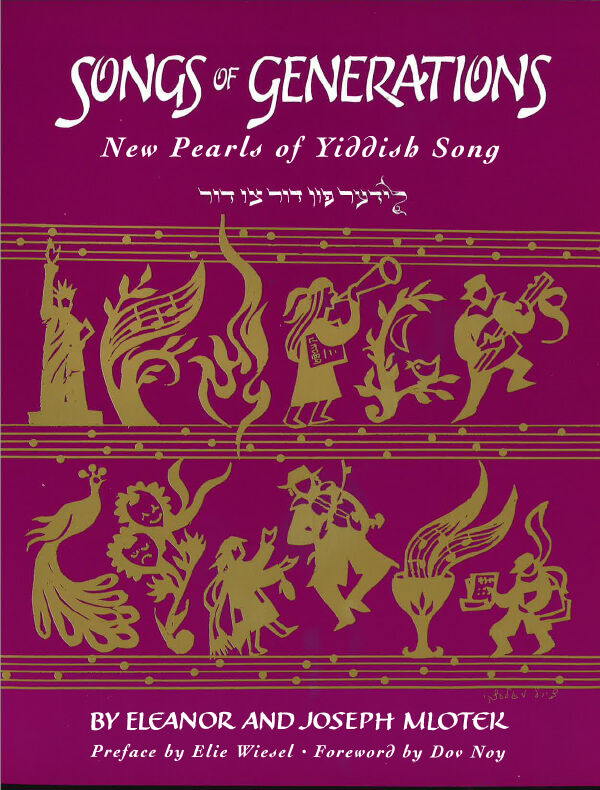Words by ltsik Manger (1901-1969); music by Nurit Hirsh. Transcribed by the compilers from a recording of Khave Alberstein on the record “Poems and Songs by ltzik Manger,” CBS 52568.

With your eyes closed
you can hear the ocean nearer.
With feverish fingers
you feel the rhyme more easily.
The golden peacock,
you recognize in its flight.
And a longing is lovelier
when it’s for someone who is not here.
Tiredness grows tireder
at the threshold of a house,
when you kneel, you feel more keenly
that God is great.
God incomparable is great,
today just as long ago.
Not because he is thundering in heaven,
but because he is sobbing in the valley.
And blessed is the one
who hears the sobbing,
to be the one to hear it,
has been your destiny.
And a tear has fallen
into your spirit,
and with a wound and with wonder
has blossomed into your song.
Mit farmakhte oygn
Herstu nenter dem yam.
Mit fiberndike finger
Filstu gringer dem gram.
Di goldene pave
Derkenstu in fli.
Un a benkshaft vert shener
Ven zi iz fun nisht-hi.
Di midkeyt vert mider
Bay der shvel fun a hoyz,
Ven du knist, filstu sharfer
Az got iz groys.
Got kavikhol iz groys,
Haynt punkt vi a mol.
Nisht vayl er dunert in himl,
Nor vayl er khlipet in tol.
Az voyl iz tsu dem
Vos hot dos khlipen derhert,
Dir iz aza herung
Gevezn bashert.
Un a trer iz gefaln
In dayn gemit,
Un mit vund un mit vunder
Zikh tseblit in dayn lid.
מיט פֿאַרמאַכטע אױגן
הערסטו נענטער דעם ים.
מיט פֿיבערנדיקע פֿינגער
פֿילסטו גרינגער דעם גראַם.
די גאָלדענע פּאַװע
דערקענסטו אין פֿלי.
און אַ בענקשאַפֿט װערט שענער
װען זי איז פֿון נישט־הי,
די מידקײט װערט מידער
בײַ דער שװעל פֿון אַ הױז,
װען דו קניסט פֿילסטו שאַרפֿער
אַז גאָט איז גרױס.
גאָט כּבֿיכול איז גרױס,
הײַנט פּונקט װי אַ מאָל.
נישט װײַל ער דונערט אין הימל,
נאָר װײַל ער כליפּעט אין טאָל.
אַז װױל איז צו דעם
װאָס האָט דאָס כליפּען דערהערט,
דיר איז אַזאַ הערונג
געװעזן באַשערט.
און אַ טרער איז געפֿאַלן
אין דען געמיט,
און מיט װוּנד און מיט װוּנדער
זיך צעבליט אין דײַן ליד.
Song Title: Mit Farmakhte Oygn

The Songs of Generations: New Pearls of Yiddish Song anthology comprises songs that were either never printed before or appeared in rare and inaccessible publications — sometimes in different versions and without proper sources. Most of the songs in this book were submitted by readers of Chana and Yosl’s column “Perl fun der yidisher poezye” (Pearls of Yiddish Poetry) in the Yiddish newspaper Der Forverts (The Forward), initiated in October, 1970. Over 25 years, thousands of songs were collected in correspondence and on cassettes from readers throughout the world, and they represent a veritable national Yiddish song archive. Chana Mlotek, in her introduction, writes, “In the course of years the inquiries, contributions and enthusiasm of these readers have kept our own interest unflagging and have reinforced our dedication to this effort. And in recent years our participants have also been augmented by new readers from the former Soviet Russia, who receive our newspaper there or from newly-arrived immigrants in this country and Israel.”